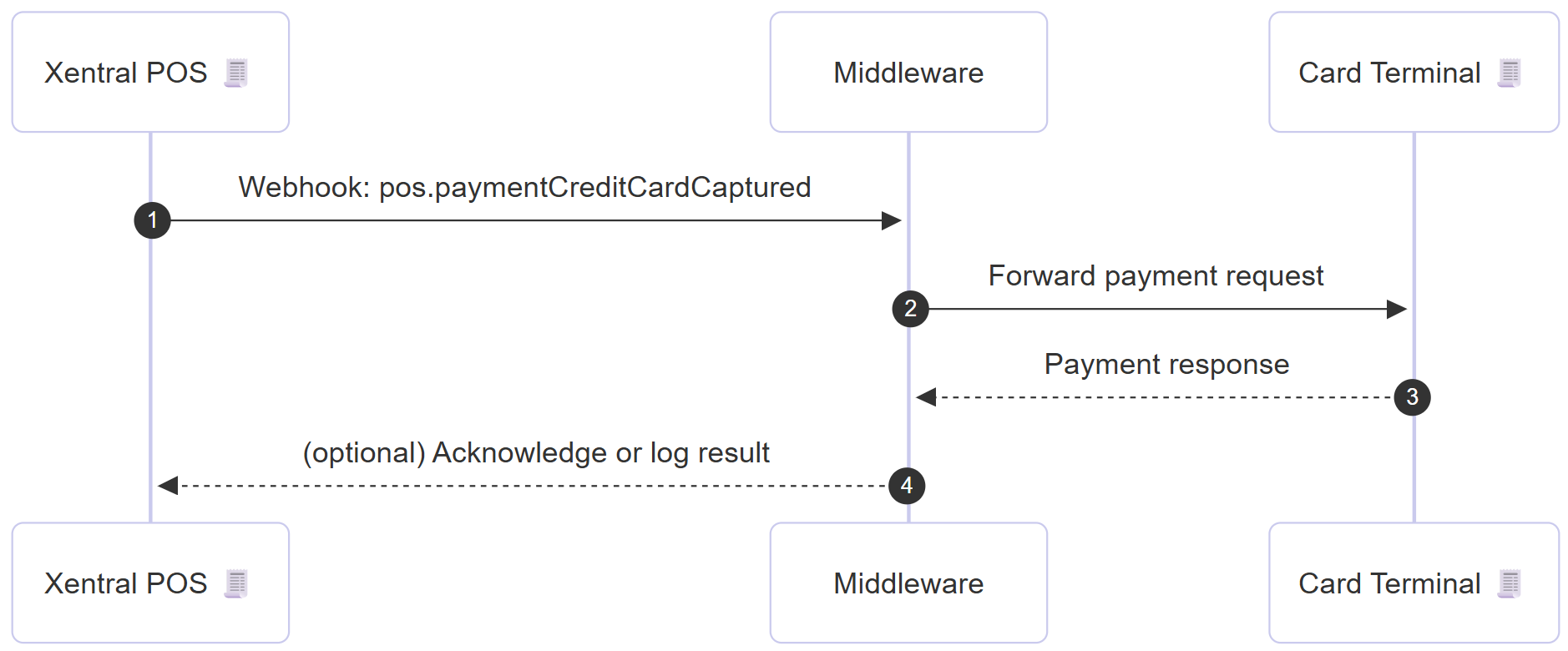Terminal Integration (Credit Debit Card Terminal)
Overview
This guide explains how to integrate a card terminal with Xentral POS to automate credit card payments.
When a credit card payment is triggered in Xentral POS, a webhook with the event type pos.paymentCreditCardCaptured is sent.
The webhook contains all necessary payment data.
Information:Xentral POS does not communicate directly with the terminal.
A middleware service is required to receive the webhook and forward the payment to the terminal.
Event Flow
Important Notice:The structure of the
pos.paymentCreditCardCapturedwebhook event is currently subject to change.
An updated version of this event is expected in July 2025.
Please use this integration with caution and anticipate potential changes to the payload format.
For implementation guidance or updates, please contact Xentral Support.
Event Trigger: pos.paymentCreditCardCaptured
pos.paymentCreditCardCapturedThis webhook is sent when a payment with credit card is selected in the POS.
Payload Example
{
"operation": "sale",
"project": {
"id": "3f942a4b-728c-4c1b-8c7c-3499f28744a1",
"number": "POS-01"
},
"currency": "EUR",
"amount": 25.90,
"documentNumber": "40001234",
"documentType": "invoice",
"createdAt": "2025-06-11T15:32:00+02:00"
}Payload fields include:
- amount – The payment amount
- currency – e.g. EUR
- operation – e.g. sale or refund
- project – Optional, to distinguish between multiple registers
For full payload structure, see Webhook Reference.
Middleware Requirements
To integrate the terminal, you need a middleware component that:
- Receives the webhook from Xentral POS
- Forwards the payment request to your terminal via API or local interface
The middleware can be built with Node.js (e.g. Express), Python (e.g. Flask), or any other HTTP-capable backend framework.
Example Architecture

Implementation Example (Python Flask)
from flask import Flask, request, jsonify
import requests
app = Flask(__name__)
@app.route('/webhook/pos-payment', methods=['POST'])
def handle_webhook():
data = request.json
amount = data.get('amount')
currency = data.get('currency')
operation = data.get('operation')
project = data.get('project')
terminal_url = "http://192.168.1.100:8080/payment"
terminal_payload = {
"amount": amount,
"currency": currency,
"type": operation
}
try:
terminal_response = requests.post(terminal_url, json=terminal_payload, timeout=5)
terminal_response.raise_for_status()
return jsonify({"status": "success", "terminal_response": terminal_response.json()})
except requests.exceptions.RequestException as e:
return jsonify({"status": "error", "message": str(e)}), 500
if __name__ == '__main__':
app.run(host='0.0.0.0', port=5000)Requirements
- Python 3.x
- Flask and requests libraries
- Accessible terminal IP or network interface
Advanced Example: ZVT-based Terminal Integration
from flask import Flask, request
from ecrterm import ECR
app = Flask(__name__)
@app.route('/webhook/pos-payment', methods=['POST'])
def handle_webhook():
data = request.json
amount = data.get('amount')
currency = data.get('currency')
operation = data.get('operation')
terminal = ECR(host='192.168.1.100', port=12345)
if operation == 'sale':
response = terminal.sale(amount)
elif operation == 'refund':
response = terminal.refund(amount)
else:
return 'Invalid operation', 400
if response.success:
return 'Payment processed successfully', 200
else:
return 'Payment failed', 500
if __name__ == '__main__':
app.run(host='0.0.0.0', port=5000)Who Can Implement This?
Any developer or technician with basic web development skills:
- Ability to create a REST API
- Knowledge of HTTP, local IP addressing
- Basic understanding of payment systems or terminal APIs
No deep ERP knowledge is required — just the ability to receive data and forward it to a device.
Updated 5 months ago